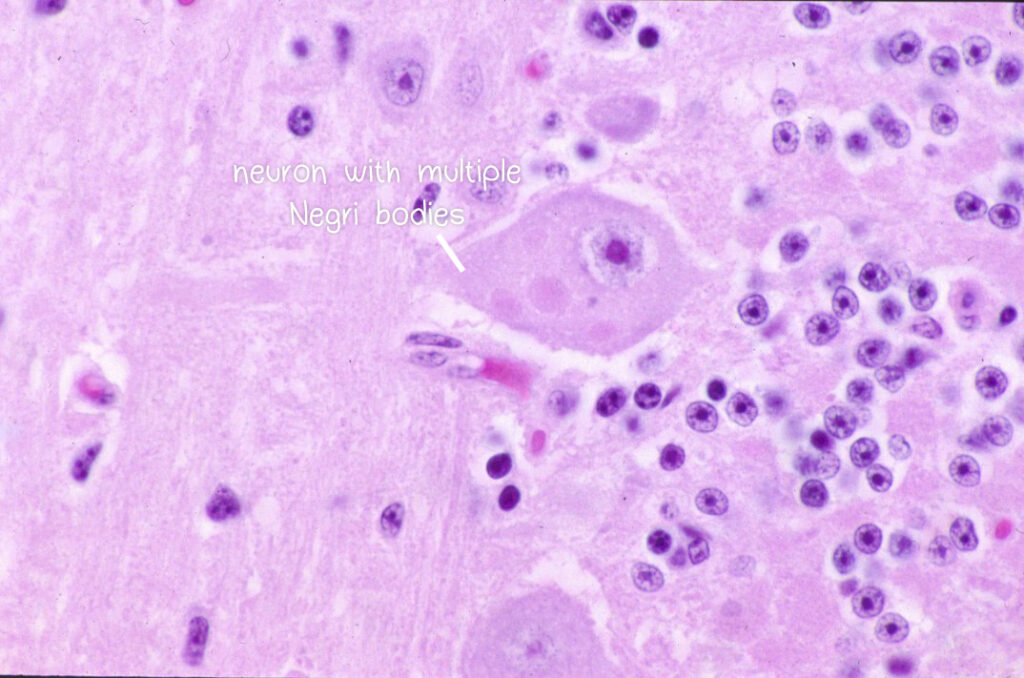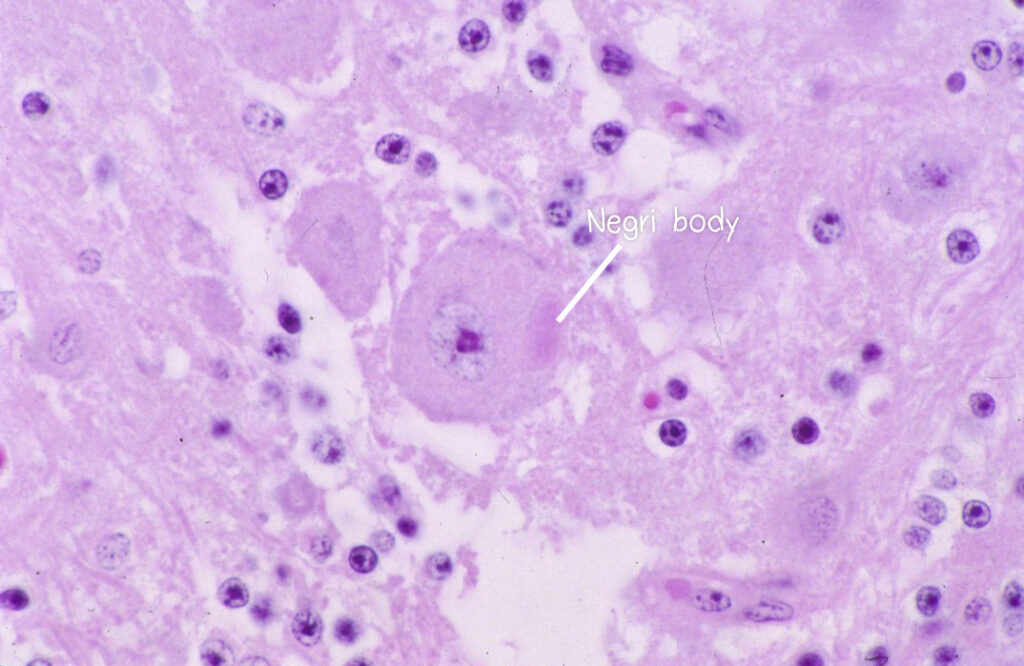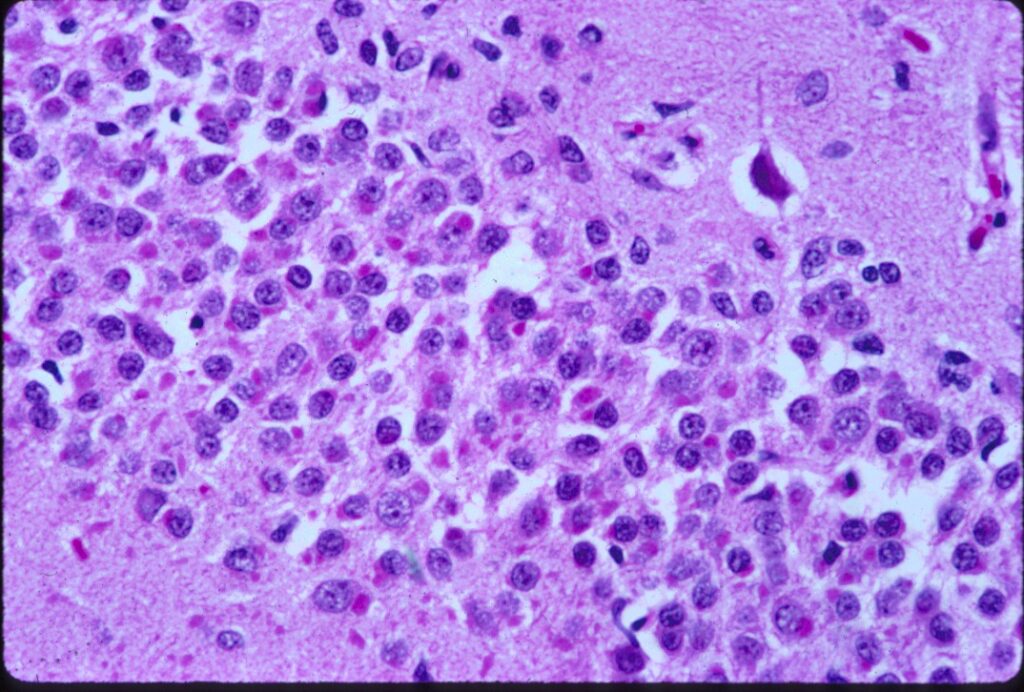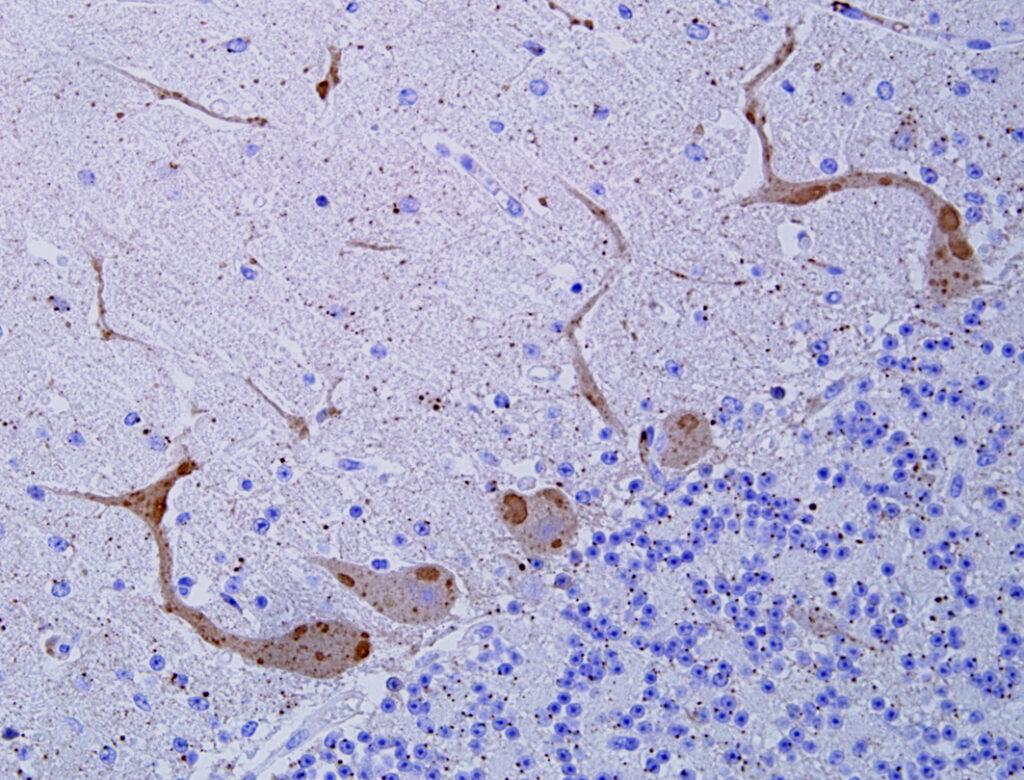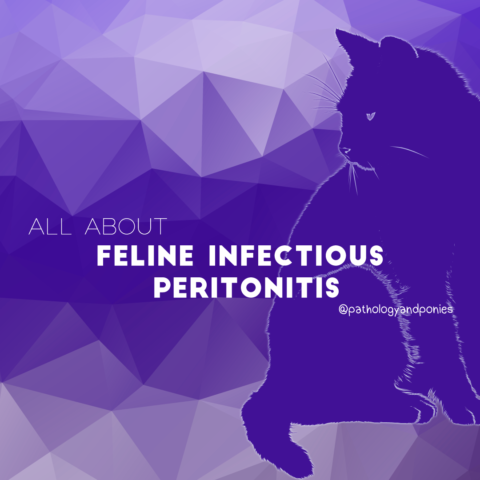Today’s path rounds are on 𝐫𝐚𝐛𝐢𝐞𝐬!
𝐖𝐡𝐚𝐭 𝐢𝐬 𝐢𝐭?
𝐑𝐚𝐛𝐢𝐞𝐬 is a viral disease caused by a 𝐋𝐲𝐬𝐬𝐚𝐯𝐢𝐫𝐮𝐬, which are viruses typically found in bats. Current evidence suggests that rabies virus developed initially in vampire bats, and later became adapted to carnivores.
𝐖𝐡𝐨 𝐠𝐞𝐭𝐬 𝐢𝐭?
All mammalian species are susceptible to rabies, which makes it somewhat unique!
𝐇𝐨𝐰 𝐝𝐨 𝐚𝐧𝐢𝐦𝐚𝐥𝐬 𝐠𝐞𝐭 𝐢𝐧𝐟𝐞𝐜𝐭𝐞𝐝?
Animals typically get infected by a bite wound from an infected animal. This is because rabies has a 𝐭𝐫𝐨𝐩𝐢𝐬𝐦 (the virus seeking out a particular tissue) for the salivary glands, so the virus is shed in an infected animal’s saliva.
After infected saliva is transferred into a wound, the virus enters the surrounding muscle cells and begins to replicate itself. From there, it enters a local nerve and moves 𝐫𝐞𝐭𝐫𝐨𝐠𝐫𝐚𝐝𝐞 (up the nerve) until it reaches the brain. The brain is the virus’ preferred home, so it sets up shop and begins multiple rounds of replication. The virus then spreads back to the salivary glands to allow infection of other animals.
𝐖𝐡𝐚𝐭 𝐡𝐚𝐩𝐩𝐞𝐧𝐬 𝐢𝐧 𝐫𝐚𝐛𝐢𝐞𝐬 𝐢𝐧𝐟𝐞𝐜𝐭𝐢𝐨𝐧?
Rabies typically has a very short clinical course, ranging from 1-10 days in length. Unfortunately, rabies is nearly always fatal for infected animals.
There are thought to be two different clinical forms of rabies. The first form is the “furious form”, which is the form that most people associate with rabies infection. In this form, animals show aggression, self-mutilation, irritability and anxiety. Carnivores with this form of rabies often exhibit 𝐩𝐢𝐜𝐚 (ingestion of non-food objects). The second form is the “dumb form”, where animals exhibit 𝐚𝐭𝐚𝐱𝐢𝐚 (difficulty walking), paralysis, excessive salivation and the inability to swallow. However, it is more likely that these are just progressive stages of the disease in most species.
𝐇𝐨𝐰 𝐢𝐬 𝐢𝐭 𝐝𝐢𝐚𝐠𝐧𝐨𝐬𝐞𝐝?
In general, rabies should be suspected any time a terrestrial animal is behaving abnormally, especially if they are showing neurologic signs like ataxia and paralysis. 𝐀𝐧𝐢𝐦𝐚𝐥𝐬 𝐰𝐢𝐭𝐡 𝐬𝐮𝐬𝐩𝐞𝐜𝐭𝐞𝐝 𝐫𝐚𝐛𝐢𝐞𝐬 𝐬𝐡𝐨𝐮𝐥𝐝 𝐛𝐞 𝐞𝐮𝐭𝐡𝐚𝐧𝐢𝐳𝐞𝐝 𝐚𝐧𝐝 𝐬𝐞𝐧𝐭 𝐟𝐨𝐫 𝐧𝐞𝐜𝐫𝐨𝐩𝐬𝐲. This is because the preferred tissue for diagnosis is the brain, where the virus is most prevalent.
Typically, rabies is diagnosed using 𝐢𝐦𝐦𝐮𝐧𝐨𝐟𝐥𝐮𝐨𝐫𝐞𝐬𝐜𝐞𝐧𝐜𝐞, where an antibody against rabies that has a molecule of fluorescent dye attached to it is introduced to a tissue. If the tissue contains rabies virus, the antibody will bind to the cell, displaying the dye and confirming the diagnosis.
However, pathologists also like to look at the tissue under the microscope (because we’re nerds), and one of the classic indicators of rabies are round 𝐚𝐜𝐢𝐝𝐨𝐩𝐡𝐢𝐥𝐢𝐜 (pink) structures called 𝐍𝐞𝐠𝐫𝐢 𝐛𝐨𝐝𝐢𝐞𝐬 within neurons. These structures actually contain the rabies virus and the proteins it produces! Cool.
𝐇𝐨𝐰 𝐢𝐬 𝐢𝐭 𝐩𝐫𝐞𝐯𝐞𝐧𝐭𝐞𝐝?
The best method of prevention is routine rabies vaccination, particularly for animals that may come into contact with bats or small carnivorous wildlife. Because this disease also affects humans, prevention is critical to keep all of us, and our pets, safe!
𝐏𝐡𝐨𝐭𝐨𝐬
1-3) Examples of Negri bodies seen at histology.
4) An example of 𝐢𝐦𝐦𝐮𝐧𝐨𝐡𝐢𝐬𝐭𝐨𝐜𝐡𝐞𝐦𝐢𝐬𝐭𝐫𝐲, which works similar to immunofluorescence, demonstrating the virus within neurons.
5) A video of a horse with rabies exhibiting self-mutilation behaviour.
𝐒𝐨𝐮𝐫𝐜𝐞𝐬
Maxie, G. Jubb, Kennedy and Palmer’s Pathology of Domestic Animals, Volume 1. Sixth Edition.
Rupprecht, C.E. Rabies. Merck Veterinary Manual, 2020.
Photos 1-4 courtesy of Noah’s Arkive.
Video courtesy of Katie LoPresti.

